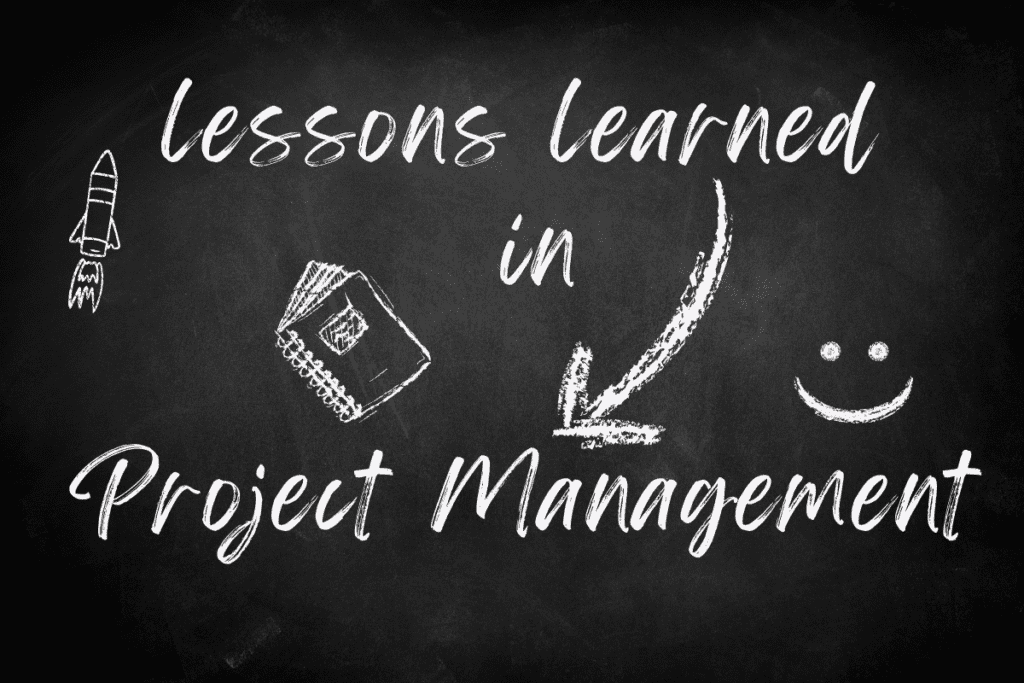Lessons Learned in Project Management: Real-Life Examples and Best Practices
As project managers, we’ve all faced that moment post-project completion: the reflection. Think about your last big project—did it go off without a hitch? Or were there unexpected hiccups along the way? Whether you’re leading a small team or managing large-scale projects, understanding what went right and what could have been done better is crucial for growth. One golden key to continual improvement lies within lessons learned in project management.
This process captures valuable insights from each venture, giving you a strong foundation to build upon for future success.
As you read on, we’ll guide you through real-life examples and best practices that can transform your approach to projects. Let’s unlock enhanced productivity together! Keep reading; this may be just what your next project needs.
Key Takeaways
- Lessons learned in project management help teams get better. They use notes from past projects to avoid old mistakes and do good things again.
- To capture lessons, watch the project closely, talk about wins and losses, listen to team ideas, check goals, compare with other projects, keep records as you go, and ask experts.
- When a project ends, hold a meeting to talk about what was learned. Make sure everyone can speak freely and take notes on the important points to act on later.
- Writing down what you learn in a report helps save it for later. The report should say who will read it, list main lessons, summarize them clearly, then share and keep it safe.
- Good examples of lessons include handling project scope well so work stays on track; timing things right for quick finishes; managing money smartly; making sure quality is top-notch; spotting risks early; keeping stakeholders happy; using resources best way possible; clear talking between everyone involved.
Understanding Lessons Learned in Project Management

Understanding lessons learned in project management is crucial for the success of future projects. It involves capturing, analyzing, and documenting insights gained throughout the project lifecycle to improve processes and avoid repeating mistakes.
Effective lessons learned can inform decision-making, enhance project planning, and contribute to overall project success.
Definition and Importance
Lessons learned in project management are like treasure maps from past projects. They guide you to avoid mistakes and find the best paths to success. Think of them as notes that a team writes during and after they finish work.
These notes are valuable because they help everyone do better next time.
Why are lessons learned so important? Because they turn good teams into great ones. By looking closely at what worked and what didn’t, you make sure the same problems don’t pop up again.
Plus, when new challenges come, your team is ready with answers that work, making every project smoother and more successful.
Purpose of Lessons Learned
Having a clear grasp on what lessons learned are and why they matter sets the stage for discussing their purpose. Think of lessons learned as tools that help project teams get better over time.
They are like secret ingredients to cook up success in future projects by using knowledge from the past.
We capture these lessons to do several things. First, we want to celebrate our wins and understand how we made good things happen so we can do it again. Second, we look at mistakes and find out why they occurred to avoid repeating them.
This practice is not just about fixing problems but also about making sure our team grows stronger with every project completed.
Through this process, the whole team becomes smarter collectively. Instead of keeping useful tips or cautionary tales locked away, sharing them helps everyone involved in a project learn together.
It’s about building a culture where learning from experience is valued and encouraged—an approach that leads directly into capturing these insights effectively through documentation and analysis.
Lessons Learned Detailed Template
Understanding how to solidify the insights from your project is imperative. A lessons learned template serves as a valuable tool in capturing the knowledge gained. It ensures these lessons become a resource for current and future projects. Below is a detailed template in HTML format that you can integrate into your project management practice.
Lessons Learned Detailed Template
| Lesson ID | Date | Project Phase | Description of Experience | Impact (Positive/Negative) | Cause of Issue | Recommendations for Improvement | Action Items | Responsible Party | Due Date for Action Items | Lesson Learned Status |
|---|---|---|---|---|---|---|---|---|---|---|
| 001 | MM/DD/YYYY | Initiation | Detailed description of what happened and what was learned. | Positive/Negative | Root cause of the situation. | Specific recommendations to avoid recurrence or to replicate success. | Concrete steps to be taken. | Who is responsible for implementing recommendations. | When the action items are expected to be completed. | Open/Closed |
This format helps to bulletproof your future endeavors with insights that only hands-on experience can teach. Employ this template to create an actionable knowledge base that drives continuous improvement. Project Professionals and New Project Managers alike can adapt this to their specific needs for a structured and effective approach to documenting lessons learned.
Process of Capturing Lessons Learned

Capturing lessons learned involves identifying key insights and takeaways from the project, documenting them in detail, analyzing their impact on the project’s success or failure, storing them for future reference, and retrieving them when needed.
This process is crucial for continual improvement and ensuring that valuable knowledge gained throughout the project lifecycle is not lost.
Identifying
Identifying lessons learned is key to improving future projects. It involves a keen eye for detail and a commitment to growth. Here’s how you can do it:
- Pay close attention during the entire project. Watch how team members work and where problems pop up.
- Look at mistakes as learning opportunities. Figure out what went wrong and why.
- Listen to your team. They might have insights into what could be done better next time.
- Check on goals often. See if you’re meeting them or if you need to change your plan.
- Use tools like surveys or meetings to get feedback from stakeholders. They’ll tell you what worked and what didn’t.
- Compare your project with past ones. This can show you new things to try or avoid.
- Keep records of issues and successes as they happen. This makes it easier to remember them later.
- Ask experts for their thoughts on the project processes and outcomes.
Documenting
Documenting lessons learned is crucial for the continuous improvement of project management practices. This process involves gathering and recording valuable insights and experiences gained throughout the project. Here’s a detailed guide to help you understand how to effectively document lessons learned:
- Compile all relevant information, including successes, challenges, and unforeseen issues encountered during the project.
- Use a standardized template to capture essential details such as project scope, resources utilized, timeline adherence, and stakeholder engagement.
- Ensure that each lesson learned is clearly documented with emphasis on the impact it had on the project and potential areas for improvement.
- Categorize the lessons learned based on different aspects of project management such as risk assessment, time management, stakeholder communication, and quality control.
- Include specific examples or case studies that illustrate how applying past lessons learned has positively influenced subsequent projects.
Analyzing
When analyzing lessons learned in project management, it is crucial to:
- Review the documented lessons with the entire project team, discussing what worked well and what needs improvement.
- Evaluate the root causes of any issues or challenges encountered during the project to understand their underlying reasons.
- Identify common themes or patterns across different projects and look for opportunities to apply lessons learned in future endeavors.
- Use key performance indicators (KPIs) and other metrics to measure the impact of implemented lessons and determine their effectiveness.
- Encourage open discussion and feedback from all project stakeholders to gain a comprehensive understanding of the lessons learned and their implications.
Storing
Storing lessons learned is essential for future projects.
- Use a centralized repository such as a digital database or knowledge management system for easy access by project team members.
- Ensure that the stored lessons are organized by categories such as project phase, type of lesson, or department for efficient retrieval.
- Regularly update the storage system with new lessons learned throughout the project life cycle to maintain relevance and accuracy.
- Consider using project management software to streamline the storage process and facilitate collaborative access and contribution.
- Implement a tagging system to categorize and label stored lessons for quick search and retrieval, enhancing usability and accessibility.
Retrieving
When it comes to the “Retrieving” stage of the Lessons Learned Process in Project Management, project professionals and new project managers should keep in mind that this step is crucial for accessing valuable insights and improving future projects. Here’s a detailed guide on how to effectively retrieve lessons learned:
- Utilize a centralized repository or database that is easily accessible to all team members involved in current and future projects. This ensures that lessons learned are readily available for reference.
- Implement a tagging system or keyword search functionality within the repository to enable quick and efficient retrieval of specific lessons learned based on relevant project aspects such as scope management, time management, cost management, quality management, risk management, stakeholder management, resource management, and communication management.
- Encourage regular reviews of the lessons learned repository by project teams, allowing them to draw upon past experiences and apply valuable insights to their current project challenges.
- Provide training to team members on how to effectively navigate and use the lessons learned repository, ensuring that they are aware of its existence and understand its significance in driving continuous improvement.
- Establish a process for updating the lessons learned repository with new insights gained from ongoing projects, ensuring that it remains a dynamic resource for organizational learning and development.
How to Conduct a Lessons Learned Meeting

To conduct a successful lessons learned meeting, it’s essential to make thorough preparations and establish rules for an effective session. By creating a structured agenda and setting clear expectations for participation, project professionals can ensure that valuable insights are captured and shared in a collaborative environment.
Preparations
Getting ready for a lessons learned meeting involves setting the agenda, choosing a suitable location, and making sure all team members can attend. It’s essential to inform everyone about the purpose of the meeting and encourage them to come prepared with their insights and suggestions.
Engaging participants in an open discussion will help capture valuable lessons from different perspectives, ensuring a comprehensive understanding of the project’s successes and challenges.
By laying down clear guidelines for the meeting, you can facilitate a productive exchange of ideas that will contribute to improving future project management practices.
Rules for Running an Effective Meeting
To run an effective lessons learned meeting, follow these rules:
- Encourage Participation: Ensure everyone involved in the project has a chance to share their insights and perspectives.
- Stay Focused on Solutions: Emphasize problem-solving and actionable takeaways rather than dwelling on past mistakes.
- Establish Clear Objectives: Set specific goals for the meeting and ensure that discussions align with those objectives.
- Foster Open Communication: Create an environment where team members feel comfortable expressing their thoughts and ideas without fear of judgment.
- Assign Action Items: Clearly define next steps and responsibilities based on the lessons discussed during the meeting.
- Document Discussions: Take detailed notes to capture key points, decisions, and action items arising from the meeting.
Writing a Lessons Learned Report

When writing a lessons learned report, it’s crucial to follow a step-by-step guide and include specific examples of what was learned. This report not only serves as documentation for future reference but also provides valuable insights to improve project management processes.
Step by Step Guide
To write a lessons learned report, start by determining the audience and identifying important lessons. Summarize the key points and then distribute and store the report securely.
- Determine the Audience:
- Identify Important Lessons Learned:
- Summarize Lessons Learned:
- Distribute and Store Securely:
Sample of a Lessons Learned Report
Having traversed the step-by-step guide, let’s delve into a tangible example. Here’s a sample of a lessons learned report to give you a clearer picture of what the end product might look like. This template represents a synthesized collection of insights and experiences from a completed project, offering a blueprint for future endeavors.
| Project Name | Project A – Expansion of XYZ Services |
|---|---|
| Project Duration | January 2022 – December 2022 |
| Project Manager | Jane Doe |
| Objective | To successfully expand services to the western region, increasing customer base by 20%. |
| Scope | Scope was well-defined but underestimated resource allocation for marketing activities. |
| Time Management | Project delays encountered due to vendor turnover; future projects need earlier vetting of vendor stability. |
| Cost Management | Stayed under budget by 5% due to efficient resource management. |
| Quality Management | Client satisfaction exceeded expectations; however, post-deployment support needs a structured approach. |
| Risk Management | Identified risks were managed effectively; missed early signs of vendor instability. |
| Stakeholder Management | Engagement strategies succeeded with key stakeholders; some lower-tier stakeholders felt overlooked. |
| Resource Management | Adequately staffed; though, team could have benefited from additional training in new software tools used. |
| Communication Management | Regular updates kept the team aligned, but the absence of a centralized communication platform led to some information gaps. |
| Lessons Learned |
|
| Recommendations for Future Projects |
|
Keep in mind, the report does more than just lay a paper trail; it empowers teams to iterate on success and sidestep previous roadblocks. Remember, it’s the insights, when acted upon, that truly transform future projects.
Examples of Lessons Learned
– Scope Management: Understanding the importance of clearly defining project scope to avoid scope creep and maintain focus on project objectives.
– Time Management: Implementing effective time tracking methods to ensure timely completion of project milestones and deliverables.
– Cost Management: Learning to accurately estimate costs, track expenses, and manage budget constraints throughout the project lifecycle.
– Quality Management: Emphasizing the need for continuous quality assurance and control measures to meet or exceed stakeholder expectations.
– Risk Management: Identifying potential risks early on, developing mitigation strategies, and actively monitoring risk factors to prevent negative impacts on project outcomes.
– Stakeholder Management: Prioritizing stakeholder engagement, communication, and relationship building to ensure alignment with project goals.
– Resource Management: Optimizing resource allocation, utilization, and coordination for efficient project execution and delivery.
– Communication Management: Establishing clear communication channels and protocols among team members, stakeholders, and partners for seamless collaboration.
Scope Management
Scope management is vital in project management. It requires defining and controlling the necessary work for a project and ensuring the completion of only this specified work.
In real-life projects, capturing lessons learned can be crucial for improving scope management in future projects. Challenges with lessons learned can include difficulties in managing the scope of a project as well as potential obstacles to implementing improvements based on these lessons.
These insights help to enhance future project plans by refining processes related to scope management to prevent reoccurrence of past mistakes and improve overall project outcomes.
Time Management
Now that we’ve covered the importance of managing project scope effectively, let’s talk about another vital aspect: time management. Proper time management is crucial as it helps in meeting project deadlines and making sure tasks are completed on schedule.
One essential lesson learned is to plan and allocate sufficient time for each phase of the project, taking into account any potential setbacks or delays. By applying past lessons in effective time management, such as prioritizing tasks and setting realistic timelines based on historical data, project managers can save valuable time and ensure smoother project execution.
Managing your team’s working hours efficiently is also a key lesson learned in time management. By understanding past mistakes such as overloading team members with excessive work or not delegating tasks appropriately, you can improve productivity while maintaining a healthy work-life balance for everyone involved.
Cost Management
Real-time lessons learned can be put into action within the same project, making a real impact. When it comes to cost management, capturing and applying these insights can lead to improved financial control and resource allocation.
By identifying cost-related lessons, documenting them properly, and analyzing their implications for future endeavors, we pave the way for more efficient use of resources in similar projects ahead.
This proactive approach enables us to address potential budget overruns or underutilization of funds before they become significant issues, fostering better financial outcomes overall in project management.
Quality Management
Lessons learned in project management are vital for ensuring quality improvement and applying best practices. Collecting and sharing lessons learned can provide valuable insights for enhancing quality management processes within the organization.
It’s crucial to store these lessons in a searchable database, allowing for easy retrieval and knowledge sharing. Open communication among team members is essential for effective collaboration across departments, which plays a significant role in preventing quality issues and promoting smooth cross-functional teamwork.
Embracing project learning contributes to reducing operational costs while fostering quality management practices within the organization.
Risk Management
Now, let’s delve into risk management. Lessons learned play a crucial role in mitigating risks by identifying and addressing potential issues before they escalate. Capturing and sharing these lessons reduces project delays and operational costs, vital components of risk management.
Moreover, promoting collaboration among team members enables collective problem-solving and risk mitigation. Embracing lessons learned as part of continuous improvement efforts is essential for efficient risk management, contributing to the overall success of projects.
Lastly, valuable insights from previous experiences can significantly impact future project outcomes and strengthen risk assessment processes.
Stakeholder Management
Stakeholder management is a crucial part of lessons learned in project management. It’s essential for capturing valuable insights to enhance future project plans and processes. Surveying stakeholders for their input during a project helps gather diverse responses and lessons learned, which can be instrumental in steering clear of past mistakes in upcoming projects.
Lessons learned related to stakeholder management hold the key to avoiding repetition of errors from previous endeavors. Seeking input from stakeholders at various stages of a project enables the collection of rich and varied feedback that can significantly impact the success of future projects, benefiting both the organization and its stakeholders.
Resource Management
After focusing on the efficient management of stakeholders, it’s crucial to shift attention to resource management in project execution. This aspect entails allocating and utilizing resources effectively, including human capital, financial assets, equipment, and materials.
In a project environment, understanding how to optimize these resources is vital for meeting deadlines and staying within budget constraints.
Proper resource management enhances productivity while minimizing waste and delays. It involves identifying the right skill sets required for specific tasks, ensuring that all team members are adequately trained and motivated.
Communication Management
When it comes to project management, effective communication is key. Gathering input from everyone involved in a project, at all levels within the hierarchy, ensures comprehensive and effective lessons learned.
Lessons learned should be communicated concisely and effectively through reports, presentations, or meetings, with actionable recommendations for future projects.
Applying the lessons learned in communication management can significantly enhance project outcomes and improve team collaboration. Now let’s delve into understanding the process of capturing lessons learned.
Benefits of Lessons Learned in Project Management
Implementing lessons learned in project management offers several benefits. Firstly, it enables learning from past experiences, leading to improved decision-making. Identifying areas of inefficiency becomes easier, which contributes to reducing project delays and lowering operational costs.
Documenting processes for future teams also allows for building on the successes and avoiding repeating mistakes. Overall, embracing lessons learned creates a culture of continuous improvement within projects and helps in making informed decisions based on prior experiences.
Incorporating lessons learned into project management creates an environment where teams actively share valuable knowledge to achieve successful outcomes and minimize risks and setbacks.
This approach empowers project professionals to navigate challenges effectively by applying proven strategies and insights gained from previous projects, ultimately ensuring smoother operations and delivering successful results.
Best Practices for Lessons Learned in Project Management
Gathering information often, documenting findings well, and reviewing past lessons at each stage of a project are essential. Involving the whole team is crucial, as they provide different perspectives.
Also, closing the loop with a project retrospective ensures that all feedback is considered for future projects.
Ensuring constant improvement of project protocols and principles is critical to success. Storing lessons learned in a searchable database facilitates easy retrieval when needed, thus streamlining future processes significantly.
Conclusion
In conclusion, embracing lessons learned in project management can lead to better outcomes for future projects. By capturing and applying these insights, teams can avoid repeating mistakes and build on successful strategies.
Remember that every project provides valuable opportunities to learn and improve. Keep leveraging lessons learned as a tool for continuous growth in project management.
FAQs
1. What are “lessons learned” in project management?
In project management, you discover lessons learned during or after a project to improve future projects. This can include what went well, what didn’t, and expert advice on how to improve.
2. How do you collect and share lessons learned?
You gather details about the project’s journey at the end—what worked or caused trouble like bottlenecks—and write them down in a report. Then you tell others or keep it where everyone can find it, like a library or Google Drive with tags.
3. Why is capturing lessons learned important for successful projects?
When you understand past projects through these lessons, you avoid repeating mistakes and make good choices again which gives teams competitive advantage from leadership to supply chain management.
4. Can real-life examples of lessons learned help my business strategy?
Real-life stories of other businesses solving problems give clear pictures for your own plans—from marketing strategy to employee retention—all aiming towards better sales and customer happiness.
5. How should leaders use lessons learned for team growth?
Leaders take what they learn about successes and issues; then guide their team to use this knowledge right away in things like governance, user testing, even conflict resolution – sparking innovation along the way!
6. After learning these lessons, how does a business put them into action?
Businesses analyze findings—apply quick fixes if needed but also plan big changes; maybe reshaping corporate culture or automating certain tasks—to stay ahead of the competition.






